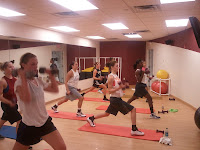
The first day of official practices is coming closer and with this comes a different coaching staff. For the first six weeks, we are patient in teaching, slowing down our instruction, repeating ourselves often, showing compassion for those who struggle in the learning process. We want the best environment for learning where the players can feel comfortable.
All of that changes as soon as we step on the court for our first real training session. For the freshmen, it is as if the coaches have changed personality, as if some alien has taken over our bodies. It is written in their faces, the way their eyes widen the first time they are yelled at and in the way their cheeks fall and their mouths stay frozen in astonishment.
I would love to be a fly on the wall listening to their rendition of their first practice experience. I'm certain they are all thinking I spent the entire practice yelling at them. At least they have upper class players to tell them all will be well. The juniors and sophomores are living proof of survival, of making it through the intensity, the demands, and the insanity of having to pay attention to every small detail.
A freshman might wonder why it is essential to do something exactly as the coaches preach but an upper class player gets it. She knows why there is such a push to make the little things perfect. She understands how one small detail like jumping to the ball on defense creates so many defensive stops. She gets how that one little detail stops a cutter to the basket, allows her to help and recover on a penetration, gets her through the screen on a back screen, and helps her hedge on a down screen.
The biggest thing the freshmen have to adjust to is not the running in practice but the mental drain of having to listen and to do all the little things. Before coming to the University of Charleston, the idea of having to talk on offense was unimaginable. Now they have call to call out everything they do: call out the person's name they are passing to, call out their screens, call out their pops and dives, call out the cut off a screen. Every freshmen usually only knows one cut off a screen and I allow them to yell "curl" for about a week before I take that away from them, and the moment I ask them to use a different read like straight, slip, fade, dive, their world falls apart.
It is the thinking that does them in. Most of them arrive believing they know basketball but as soon as we start teaching, they think they missed Basketball 101 and skipped to the advanced class. It probably doesn't help that I have rules for everything. What are the rules to be a great offensive rebounder? Number one--go for the rebound on every shot. Number two--think rebounding angles. Number three--get around a box out. What are the rules for a cutter? Number one--set your player up. Number two--wait for the screen. Number three--go off shoulder to shoulder. Number four--read your defender. Number five--call your cut. There are others. Many others. Past players could probably recite all of them. They are scripted in their brains and 20 years from now they would be able to write them down verbatim.
But for the freshmen, all of this sounds something like we are speaking in tongues. The language is new and seems weird on their lips. The court looks the same but all the rules have changed. I know it is a tough experience and their egos suffer from the constant reminder they are failing in some area, but they will get tougher and learn and eventually be thankful for the knowledge gained.
PLAY HARD. PLAY TOGETHER.

No comments:
Post a Comment